英国侵略史(英文)资料
- 格式:ppt
- 大小:761.00 KB
- 文档页数:14
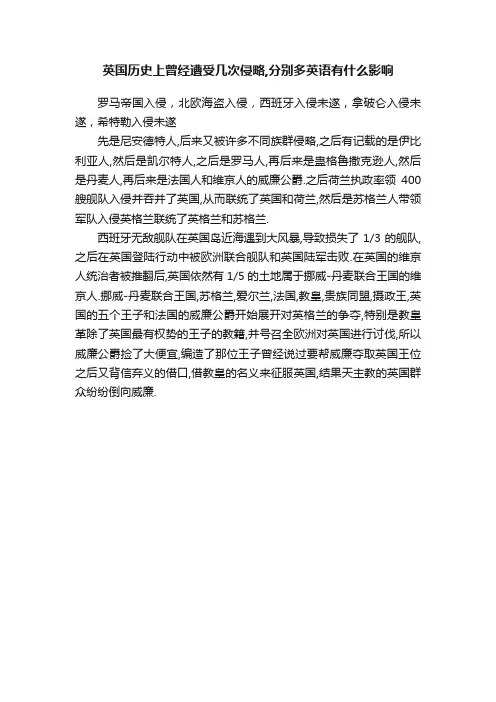
英国历史上曾经遭受几次侵略,分别多英语有什么影响
罗马帝国入侵,北欧海盗入侵,西班牙入侵未遂,拿破仑入侵未遂,希特勒入侵未遂
先是尼安德特人,后来又被许多不同族群侵略,之后有记载的是伊比利亚人,然后是凯尔特人,之后是罗马人,再后来是蛊格鲁撒克逊人,然后是丹麦人,再后来是法国人和维京人的威廉公爵.之后荷兰执政率领400艘舰队入侵并吞并了英国,从而联统了英国和荷兰,然后是苏格兰人带领军队入侵英格兰联统了英格兰和苏格兰.
西班牙无敌舰队在英国岛近海遇到大风暴,导致损失了1/3的舰队,之后在英国登陆行动中被欧洲联合舰队和英国陆军击败.在英国的维京人统治者被推翻后,英国依然有1/5的土地属于挪威-丹麦联合王国的维京人.挪威-丹麦联合王国,苏格兰,爱尔兰,法国,教皇,贵族同盟,摄政王,英国的五个王子和法国的威廉公爵开始展开对英格兰的争夺,特别是教皇革除了英国最有权势的王子的教籍,并号召全欧洲对英国进行讨伐,所以威廉公爵捡了大便宜,编造了那位王子曾经说过要帮威廉夺取英国王位之后又背信弃义的借口,借教皇的名义来征服英国,结果天主教的英国群众纷纷倒向威廉.。
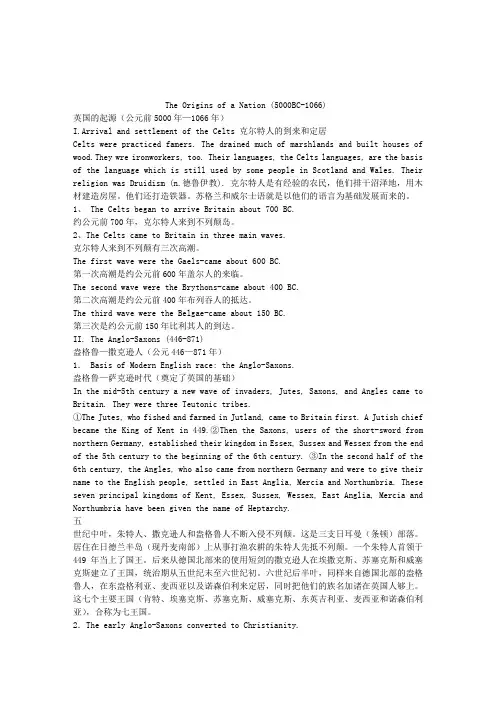
The Origins of a Nation (5000BC-1066)英国的起源(公元前5000年—1066年)I.Arrival and settlement of the Celts 克尔特人的到来和定居Celts were practiced famers. The drained much of marshlands and built houses of wood.They wre ironworkers, too. Their languages, the Celts languages, are the basis of the language which is still used by some people in Scotland and Wales. Their religion was Druidism (n.德鲁伊教). 克尔特人是有经验的农民,他们排干沼泽地,用木材建造房屋。
他们还打造铁器。
苏格兰和威尔士语就是以他们的语言为基础发展而来的。
1、 The Celts began to arrive Britain about 700 BC.约公元前700年,克尔特人来到不列颠岛。
2、The Celts came to Britain in three main waves.克尔特人来到不列颠有三次高潮。
The first wave were the Gaels-came about 600 BC.第一次高潮是约公元前600年盖尔人的来临。
The second wave were the Brythons-came about 400 BC.第二次高潮是约公元前400年布列吞人的抵达。
The third wave were the Belgae-came about 150 BC.第三次是约公元前150年比利其人的到达。
II. The Anglo-Saxons (446-871)盎格鲁—撒克逊人(公元446—871年)1. Basis of Modern English race: the Anglo-Saxons.盎格鲁—萨克逊时代(奠定了英国的基础)In the mid-5th century a new wave of invaders, Jutes, Saxons, and Angles came to Britain. They were three Teutonic tribes.①The Jutes, who fished and farmed in Jutland, came to Britain first. A Jutish chief became the King of Kent in 449.②Then the Saxons, users of the short-sword from northern Germany, established their kingdom in Essex, Sussex and Wessex from the end of the 5th century to the beginning of the 6th century. ③In the second half of the 6th century, the Angles, who also came from northern Germany and were to give their name to the English people, settled in East Anglia, Mercia and Northumbria. These seven principal kingdoms of Kent, Essex, Sussex, Wessex, East Anglia, Mercia and Northumbria have been given the name of Heptarchy.五世纪中叶,朱特人、撒克逊人和盎格鲁人不断入侵不列颠。


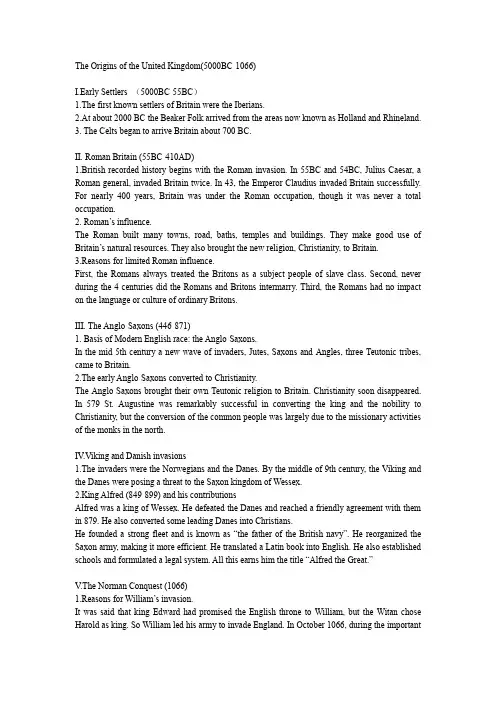
The Origins of the United Kingdom(5000BC-1066)I.Early Settlers (5000BC-55BC)1.The first known settlers of Britain were the Iberians.2.At about 2000 BC the Beaker Folk arrived from the areas now known as Holland and Rhineland.3. The Celts began to arrive Britain about 700 BC.II. Roman Britain (55BC-410AD)1.British recorded history begins with the Roman invasion. In 55BC and 54BC, Julius Caesar, a Roman general, invaded Britain twice. In 43, the Emperor Claudius invaded Britain successfully. For nearly 400 years, Britain was under the Roman occupation, though it was never a total occupation.2. Roman’s influence.The Roman built many towns, road, baths, temples and buildings. They make good use of Britain’s natural resources. They also brought the new religion, Christianity, to Britain.3.Reasons for limited Roman influence.First, the Romans always treated the Britons as a subject people of slave class. Second, never during the 4 centuries did the Romans and Britons intermarry. Third, the Romans had no impact on the language or culture of ordinary Britons.III. The Anglo-Saxons (446-871)1. Basis of Modern English race: the Anglo-Saxons.In the mid-5th century a new wave of invaders, Jutes, Saxons and Angles, three Teutonic tribes, came to Britain.2.The early Anglo-Saxons converted to Christianity.The Anglo-Saxons brought their own Teutonic religion to Britain. Christianity soon disappeared. In 579 St. Augustine was remarkably successful in converting the king and the nobility to Christianity, but the conversion of the common people was largely due to the missionary activities of the monks in the north.IV.Viking and Danish invasions1.The invaders were the Norwegians and the Danes. By the middle of 9th century, the Viking and the Danes were posing a threat to the Saxon kingdom of Wessex.2.King Alfred (849-899) and his contributionsAlfred was a king of Wessex. He defeated the Danes and reached a friendly agreement with them in 879. He also converted some leading Danes into Christians.He founded a strong fleet and is known as “the father of the British navy”. He reorganized the Saxon army, making it more efficient. He translated a Latin book into English. He also established schools and formulated a legal system. All this earns him the title “Alfred the Great.”V.The Norman Conquest (1066)1.Reasons for William’s invasion.It was said that king Edward had promised the English throne to William, but the Witan chose Harold as king. So William led his army to invade England. In October 1066, during the importantbattle of Hastings, William defeated Harold and killed him. One Christmas Day, William was crowned king of England, thus beginning the Norman Conquest of England.2.ConsequencesThe Norman Conquest of 1066 is perhaps the best-known event in English history. William the Conqueror confiscated almost all the land and gave it to his Norman followers. He replaced the weak Saxon rule with a strong Norman government. So the feudal system was completely established in England. Relations with the Continent were opened, and the civilization and commerce were extended. Norman-French culture, language, manners and architecture were introduced. The Church was brought into closer connection with Rome, and the church courts were separated from the civil courts.。
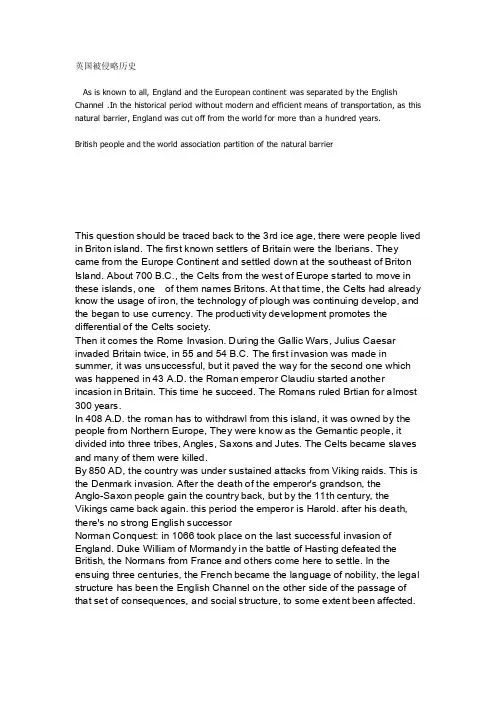
英国被侵略历史As is known to all, England and the European continent was separated by the English Channel .In the historical period without modern and efficient means of transportation, as this natural barrier, England was cut off from the world for more than a hundred years.British people and the world association partition of the natural barrierThis question should be traced back to the 3rd ice age, there were people lived in Briton island. The first known settlers of Britain were the Iberians. They came from the Europe Continent and settled down at the southeast of Briton Island. About 700 B.C., the Celts from the west of Europe started to move in these islands, one of them names Britons. At that time, the Celts had already know the usage of iron, the technology of plough was continuing develop, and the began to use currency. The productivity development promotes the differential of the Celts society.Then it comes the Rome Invasion. During the Gallic Wars, Julius Caesar invaded Britain twice, in 55 and 54 B.C. The first invasion was made in summer, it was unsuccessful, but it paved the way for the second one which was happened in 43 A.D. the Roman emperor Claudiu started another incasion in Britain. This time he succeed. The Romans ruled Brtian for almost 300 years.In 408 A.D. the roman has to withdrawl from this island, it was owned by the people from Northern Europe, They were know as the Gemantic people, it divided into three tribes, Angles, Saxons and Jutes. The Celts became slaves and many of them were killed.By 850 AD, the country was under sustained attacks from Viking raids. This is the Denmark invasion. After the death of the emperor's grandson, theAnglo-Saxon people gain the country back, but by the 11th century, the Vikings came back again. this period the emperor is Harold. after his death, there's no strong English successorNorman Conquest: in 1066 took place on the last successful invasion of England. Duke William of Mormandy in the battle of Hasting defeated the British, the Normans from France and others come here to settle. In the ensuing three centuries, the French became the language of nobility, the legal structure has been the English Channel on the other side of the passage of that set of consequences, and social structure, to some extent been affected.Above all are the mailnly invasion history of this country, hopes it helpful. I have some more in detail if you need.BC Iberian Mediterranean, BAK, Celtics, had come to Britain. 1-5 Year century Great Britain for the south-east of the Roman Empire rule. After the withdrawal of the Romans, the Anglo people in northern Europe, the Saxons, and Jutes people one after another invasion and settlement. 7th century feudal system began to take shape, and many of the small country into seven of the Kingdom, for hegemony over 200 years, known as the "Anglo - Saxon times."829 King of Wessex in love Gebert unified England. 8 Denmark were hit by the end of the century, from 1016 to 1042 for Denmark piracy empire. Following a short-term rule of King, Duke of Normandy in 1066 crossing the conquest of England. 1215 King John to sign Magna Carta, the monarchy has been inhibited.。
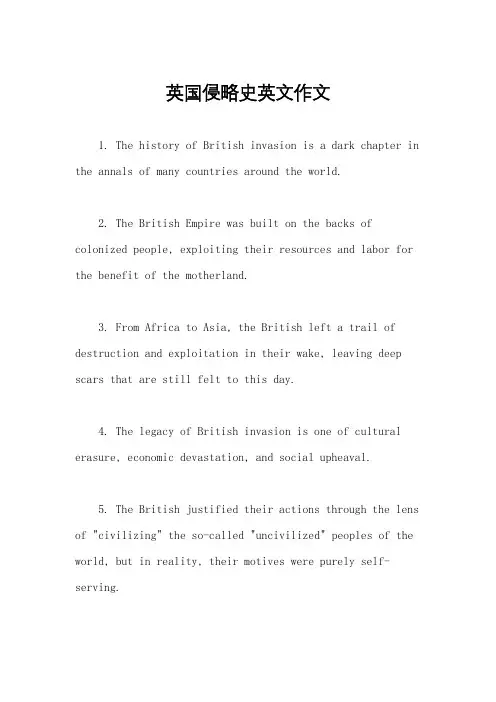
英国侵略史英文作文1. The history of British invasion is a dark chapter in the annals of many countries around the world.2. The British Empire was built on the backs of colonized people, exploiting their resources and labor for the benefit of the motherland.3. From Africa to Asia, the British left a trail of destruction and exploitation in their wake, leaving deep scars that are still felt to this day.4. The legacy of British invasion is one of cultural erasure, economic devastation, and social upheaval.5. The British justified their actions through the lens of "civilizing" the so-called "uncivilized" peoples of the world, but in reality, their motives were purely self-serving.6. The scars of British invasion can be seen in the lingering effects of colonialism, from politicalinstability to economic inequality.7. The British may have left many of their former colonies, but the impact of their invasion still reverberates through generations.8. The history of British invasion serves as a sobering reminder of the destructive power of imperialism and the importance of learning from the mistakes of the past.。
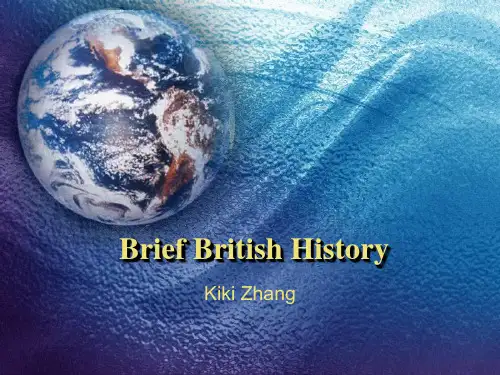
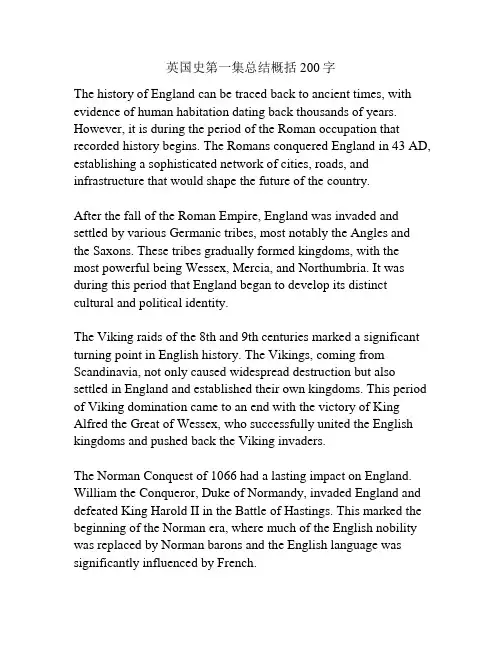
英国史第一集总结概括200字The history of England can be traced back to ancient times, with evidence of human habitation dating back thousands of years. However, it is during the period of the Roman occupation that recorded history begins. The Romans conquered England in 43 AD, establishing a sophisticated network of cities, roads, and infrastructure that would shape the future of the country.After the fall of the Roman Empire, England was invaded and settled by various Germanic tribes, most notably the Angles and the Saxons. These tribes gradually formed kingdoms, with the most powerful being Wessex, Mercia, and Northumbria. It was during this period that England began to develop its distinct cultural and political identity.The Viking raids of the 8th and 9th centuries marked a significant turning point in English history. The Vikings, coming from Scandinavia, not only caused widespread destruction but also settled in England and established their own kingdoms. This period of Viking domination came to an end with the victory of King Alfred the Great of Wessex, who successfully united the English kingdoms and pushed back the Viking invaders.The Norman Conquest of 1066 had a lasting impact on England. William the Conqueror, Duke of Normandy, invaded England and defeated King Harold II in the Battle of Hastings. This marked the beginning of the Norman era, where much of the English nobility was replaced by Norman barons and the English language was significantly influenced by French.The reign of Henry VIII in the 16th century brought about another significant change in English history. Henry VIII's desire for a male heir led him to break with the Catholic Church and establish the Church of England. This act had profound religious and political consequences, as it resulted in the Protestant Reformation and the separation of England from the authority of the Pope.The English Civil War of the 17th century was another pivotal moment in England's history. The conflict between King Charles I and Parliament led to a civil war that resulted in the execution of the king and the establishment of a republic known as the Commonwealth. This period was characterized by political and religious upheaval, with Puritanism gaining popularity and cultural icons such as William Shakespeare emerging.The Industrial Revolution of the 18th and 19th centuries transformed England into the world's leading industrial power. Technological advancements, such as the steam engine and the spinning jenny, revolutionized manufacturing and transportation, leading to urbanization and the growth of cities such as Manchester and Birmingham.The Victorian era, named after Queen Victoria, was a time of significant social and cultural change in England. It was characterized by strict social norms, scientific advancements, and the expansion of the British Empire. The Industrial Revolution also brought about significant social and economic inequalities, leading to the rise of labor movements and the struggle for workers' rights. The 20th century saw England involved in two world wars that hada profound impact on the country. The devastation of both wars led to the decline of the British Empire and the emergence of the United Kingdom as a modern welfare state. The post-war period was marked by the establishment of the National Health Service, the decolonization of many former British colonies, and the rebuilding of the economy.In conclusion, the history of England is a complex tapestry of conquest, cultural exchange, and social change. From the Roman invasion to the challenges of the Industrial Revolution and the impact of two world wars, England has continuously evolved and adapted to the changing times. Its rich history has left an indelible mark on the country and its people, shaping the nation as it exists today.。
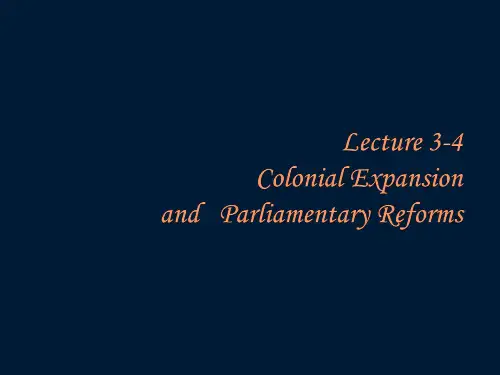
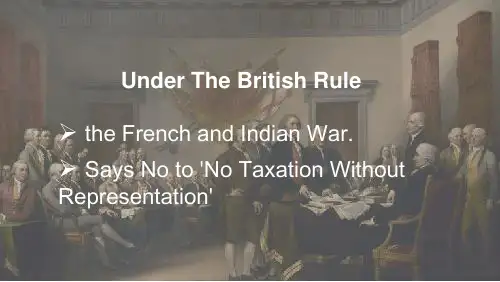
早期英国被侵略英语作文The Invasion of Early England。
Introduction:The early history of England was marked by a series of invasions and conquests by different groups of people. These invasions had a profound impact on the language and culture of England. This essay will explore the major invasions that shaped early England and the influence they had on the English language.Body:1. Roman Invasion:The first major invasion of England took place in 43 AD when the Roman Empire under Emperor Claudius invaded the island. The Romans established their rule over England, which lasted for nearly four centuries. During this time,Latin, the language of the Romans, had a significant influence on the English language. Many Latin words were adopted into English, especially in the fields of law, government, and religion. Additionally, the Romans introduced new technologies, such as roads and sanitation systems, which greatly impacted the development of England.2. Anglo-Saxon Invasion:After the fall of the Roman Empire, England faced another invasion in the 5th and 6th centuries. Germanic tribes known as the Anglo-Saxons invaded England from present-day Germany and Denmark. They gradually pushed the native Celtic-speaking Britons to the fringes of the island, establishing their own kingdoms. The Anglo-Saxon invasion had a profound impact on the English language. Old English, the language spoken by the Anglo-Saxons, became the dominant language in England. Many words from Old English are still used in modern English, such as "house," "bread," and "water."3. Viking Invasion:In the 9th and 10th centuries, England faced another wave of invasions, this time from the Vikings. The Vikings, coming from present-day Scandinavia, raided and settled in different parts of England. The Viking invasion had a significant impact on the English language, as Old Norse, the language spoken by the Vikings, influenced the English vocabulary. Many words related to maritime activities, trade, and warfare were borrowed from Old Norse into Old English. Examples include "sky," "knife," and "window."4. Norman Conquest:The most famous invasion in English history is the Norman Conquest of 1066. Led by William the Conqueror, the Normans, who were of Viking origin but had adopted French culture and language, invaded England and established Norman rule. The Norman Conquest had a profound impact on the English language. French became the language of the ruling class, and many French words were adopted into English, especially in the fields of law, government, and cuisine. This period also marked the transition from OldEnglish to Middle English.Conclusion:The early history of England was shaped by a series of invasions and conquests, each leaving its mark on the language and culture of the country. The Roman, Anglo-Saxon, Viking, and Norman invasions all had a significant impacton the English language, contributing to its richvocabulary and diverse linguistic influences. Understanding this history helps us appreciate the evolution of the English language and its enduring legacy in modern times.。
英国侵略史英文作文下载温馨提示:该文档是我店铺精心编制而成,希望大家下载以后,能够帮助大家解决实际的问题。
文档下载后可定制随意修改,请根据实际需要进行相应的调整和使用,谢谢!并且,本店铺为大家提供各种各样类型的实用资料,如教育随笔、日记赏析、句子摘抄、古诗大全、经典美文、话题作文、工作总结、词语解析、文案摘录、其他资料等等,如想了解不同资料格式和写法,敬请关注!Download tips: This document is carefully compiled by theeditor. I hope that after you download them,they can help yousolve practical problems. The document can be customized andmodified after downloading,please adjust and use it according toactual needs, thank you!In addition, our shop provides you with various types ofpractical materials,such as educational essays, diaryappreciation,sentence excerpts,ancient poems,classic articles,topic composition,work summary,word parsing,copyexcerpts,other materials and so on,want to know different data formats andwriting methods,please pay attention!The British Empire once spread its power all over the world. They invaded many countries and lands, bringing war and destruction.In many places, they took away resources and wealth, leaving people in poverty and suffering.The British army was strong and ruthless, causing great pain and loss wherever they went.They left a mark of aggression and dominance in history that can never be forgotten.。